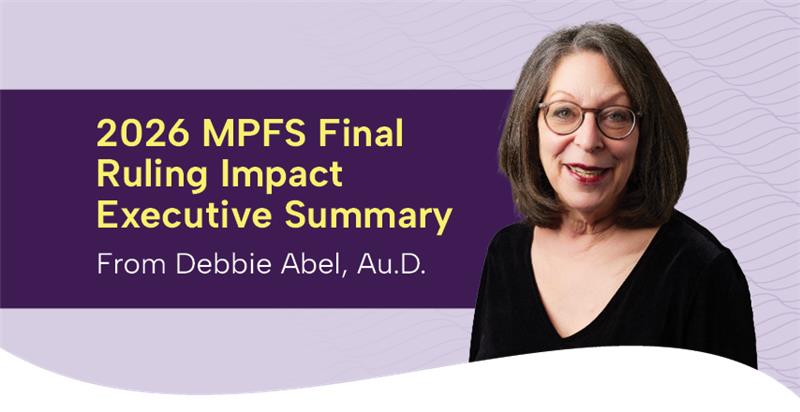
The Centers for Medicare and Medicaid Services (CMS) released the 2026 Medicare Physician Fee Schedule Final Rule on October 31, 2025, indicating the changes effective January 1, 2026, impacting Part B Medicare Beneficiaries and providers.
This year marks a significant change for audiologists with the creation of 12 new CPT® codes and the deletion of the 6 legacy codes impacting hearing aid services.
12 New CPT codes and the deletion of 6 CPT codes, effective January 1, 2026

ASHA and AAA, the code creators, have stated that new codes needed to be created for the professional services of hearing aid delivery to “modernize audiologic services” and “…are reflective of today’s audiology service delivery models and will replace the longstanding CPT code set for hearing aid services.”
There are no Relative Value Units (RVUs) assigned to them; therefore, each payer will reimburse at rates they have established individually, including Medicaid. It is important to note that just because there are new codes, a payer is not required to adopt their use, so you will want to check your fee schedules and do a query as part of your verification of benefits process. It is suggested that you know your hourly rate and desired profit to determine if these new codes are ones you choose to utilize and delete the 92590-92595 codes from your Office Management Systems and superbill/encounter forms effective 1/1/26.
CPT codes utilized by audiologists are bilateral. Several of the new codes are written as “unilateral or bilateral.” In the verification process, you can ask if they will recognize the RT modifier for the right ear or the LT modifier for the left ear when indicating monaural use OR the -50 modifier to indicate bilateral or both RT and LT to indicate bilateral, when indicated, to avoid denials.
It is recommended you indicate the start and end times you spent with the patient in their record. This is critical if audited as well as if you combine more than one-time base code on the same date of service.
There will be no changes to the HCPCS code set, therefore V5008-V5299 remain intact. You will want to look at your current fee schedules to see if these new CPT codes will be added and if you will utilize them. This will not happen on 1/1/26 and their use may result in a delay in payment as they adopt not only these codes into their systems but additional CPT codes across the health care continuum. You may need to check weekly in your patient portals, Availity or your verification of benefits process. It is suggested that you create a spreadsheet for each of the new codes and what each contracted payer will be reimbursing if you are an in-network provider to ensure you are being paid at the rates of your contract. You may need to consider out of network options as well. Audigy members are encouraged to check with your Strategic Business Unit (SBU) to ensure the use of the codes is sustainable.
The deleted codes effective 1/1/26 are:
- 92590 — Hearing aid examination and selection; monaural
- 92591 — Binaural
- 92592 — Hearing aid check; monaural
- 92593 — Binaural
- 92594 — Electroacoustic evaluation for hearing aid; monaural
- 92595 — Binaural
The new codes, effective 1/1/26, are below. Those indicated with a + are add-on codes and can be billed only when the base code was performed. An example is 92639. It can be billed only if also performed on the same date of service as 92634, 92636.
92628 — Evaluation for hearing aid candidacy, unilateral or bilateral, including review and integration of audiologic function tests, assessment, and interpretation of hearing needs (that is, speech in noise, suprathreshold hearing measures), discussion of candidacy results, counseling on treatment options with report, and when performed, assessment of cognitive and communication status; first 30 minutes
- Do not report in conjunction with 92631, 92632, 92636, 92637 or 92642
- Do not report in conjunction with 92622, 92623, 92626, 92627, if performed on the same ear
- +92629 — Evaluation for hearing aid candidacy, unilateral or bilateral, including review and integration of audiologic function tests, assessment, and interpretation of hearing needs (that is, speech in noise, suprathreshold hearing measures), discussion of candidacy results, counseling on treatment option with report, and when performed, assessment of cognitive and communication status; each additional 15 minutes (list separately in addition to code for primary procedure)
92631 — Hearing aid selection services, unilateral or bilateral, including review of audiologic function tests and hearing aid candidacy evaluation, assessment of visual and dexterity limitations, and psychosocial factors, establishment of device type, output requirements, signal-processing strategies and additional features, discussion of device recommendations with report, first 30 minutes
- Do not report in conjunction with 92628, 92629, 92636, 92637 or 92642
- Do not report in conjunction with 92622, 92623, 92626, 92627, if performed on the same ear
- +92632 — Hearing aid selection services, unilateral or bilateral, including review of audiologic function tests and hearing aid candidacy evaluation, assessment of visual and dexterity limitations, and psychosocial factors, establishment of device type, output requirements, signal-processing strategies and additional features, discussion of device recommendations with report; each additional 15 minutes (list separately in addition to code for primary procedure)
92634 — Hearing aid fitting services, unilateral or bilateral, including device analysis, programming, verification, counseling, orientation, and training, and when performed, hearing assistive device, supplemental technology fitting services; first 60 minutes
- Do not report in conjunction with 92636, 92637 or 92642
- +92635 — Hearing aid fitting services, unilateral or bilateral, including device analysis, programming, verification, counseling, orientation, and training, and when performed, hearing assistive device, supplemental technology fitting services; each additional 15 minutes (list separately in addition to code for primary procedure)
92636 — Hearing aid post-fitting follow-up services, unilateral or bilateral, including confirmation of physical fit, validation of patient benefit and performance, sound quality of device, adjustment(s) (that is, verification, programming adjustment[s], device connection[s], and device training), as indicated, and when performed, hearing assistive device, supplemental technology fitting services; first 30 minutes
- Do not report in conjunction with 92628, 92629, 92631, 92632, 92634, 92635 or 92642
- +92637 — Hearing aid post-fitting follow-up services, unilateral or bilateral, including confirmation of physical fit, validation of patient benefit and performance, sound quality of device, adjustment(s) (that is, verification, programming adjustment[s], device connection[s], and device training), as indicated, and when performed, hearing assistive device, supplemental technology fitting services; each additional 15 minutes (list separately in addition to code for primary procedure)
- +92638 — Behavioral verification of amplification including aided thresholds, functional gain, speech in noise, when performed (list separately in addition to code for primary procedure)
- Use in conjunction with 92634 and 92636
- +92639 — Hearing aid measurement, verification with probe microphone (list separately in addition to code for primary procedure)
- Use in conjunction with 92634 and 92636
92641 — Hearing device verification, electroacoustic analysis
92642 — Hearing assistive device, supplemental technology fitting services (that is, personal frequency modulation [FM]/digital modulation [DM] system, remote microphone, alerting devices)
- Do not report in conjunction with 92631, 92632, 92634, 92635, 92636, 92637, 92638 or 92639
A few considerations as you operationalize these codes:
- Just because there is a code, the payer may not recognize it and as part of your hearing aid verification process, you should ask if it’s a covered service if it is an in-network provider.
- If it is not a covered service, you should ask if the patient can be responsible with a notice of non-coverage (waiver) and ask if they have one.
- Out of network providers can bill the patient for services and can either offer the patient to bill for the services as a courtesy or offer them a claim they can submit.
- The time-based codes are not restricted to just the time noted in the code descriptor. A code indicated by “first 30 minutes” must have patient time at least 51% of the time of the code and additional time on the end side. An example would be that you can bill 92628 if you are with the patient performing what is listed in the code for 16-37 minutes. If you went over 37 minutes, you would bill the add-on code, 92629, for each additional 15-minute increment as 1 unit, starting at 38 minutes. There may be caps for the number of units you are allowed to bill.
- For the 60-minute code of hearing aid fitting, 92634, you would need to fulfill 31-67 minutes and if you were with the patient fulfilling the code’s requirements that extended over that, you would bill the add-on code, 92635 for each additional 15 minutes, starting at 68 minutes.
- CPT codes 92638 and 92639, both add-on codes, are not time based.
- CPT codes 92641 and 92642 are not time-based codes and can stand alone. They may need a modifier for RT or LT if monaural OR RT and LT if binaural AND/OR -50 if binaural. This will be payer specific.
- The -52 modifier, reduced services, cannot be appended to a time-based code.
Payment Impact

The 2026 conversion factor is expected to be $33.40, a 3.26% increase from 2025 ($32.35). Historically this has been an annual decrease, but due to a change in how the Conversion Factor was determined for this year, it results in an increase. For the first time, CMS has created two conversion factors, one for non-Qualifying Alternative Payment Model (APM) Participants which included most audiologists, and those who are in a Qualifying APM. This allows for a one-time temporary increase of 2.5%, but the overall impact to audiology services will vary due to other implemented changes.
Telehealth Services

CMS did not re-extend telehealth coverage for audiology services after September 30, 2025, which were covered during the federal Public Health Emergency (PHE). Prior to the PHE, audiologists were not recognized by Medicare for diagnostic services provided via telehealth, and until Congress addresses this, audiologists cannot be recognized currently for services via telehealth for Medicare Part B beneficiaries. At the time this was written, the government shutdown was affecting any legislation that can enact change to this guidance.
CMS did include CPT codes 92622 (diagnostic analysis, programming, and verification of an auditory osseointegrated sound processor, any type; first 60 minutes) and 92623 (diagnostic analysis, programming, and verification of an auditory osseointegrated sound processor, any type; each additional 15 minutes, list separately in addition to code for primary procedure) to the Medicare Telehealth Services List.
For up-to-date information, visit the CMS dedicated pages regarding audiology services. Audigy members can check Nexus for updates and additional resources over the coming months, or reach out to their SBU or Debbie Abel with questions.
Coding changes have you stressed?
Request a free 30-minute consultation, and Debbie Abel can walk through your coding challenges and strategies with you.